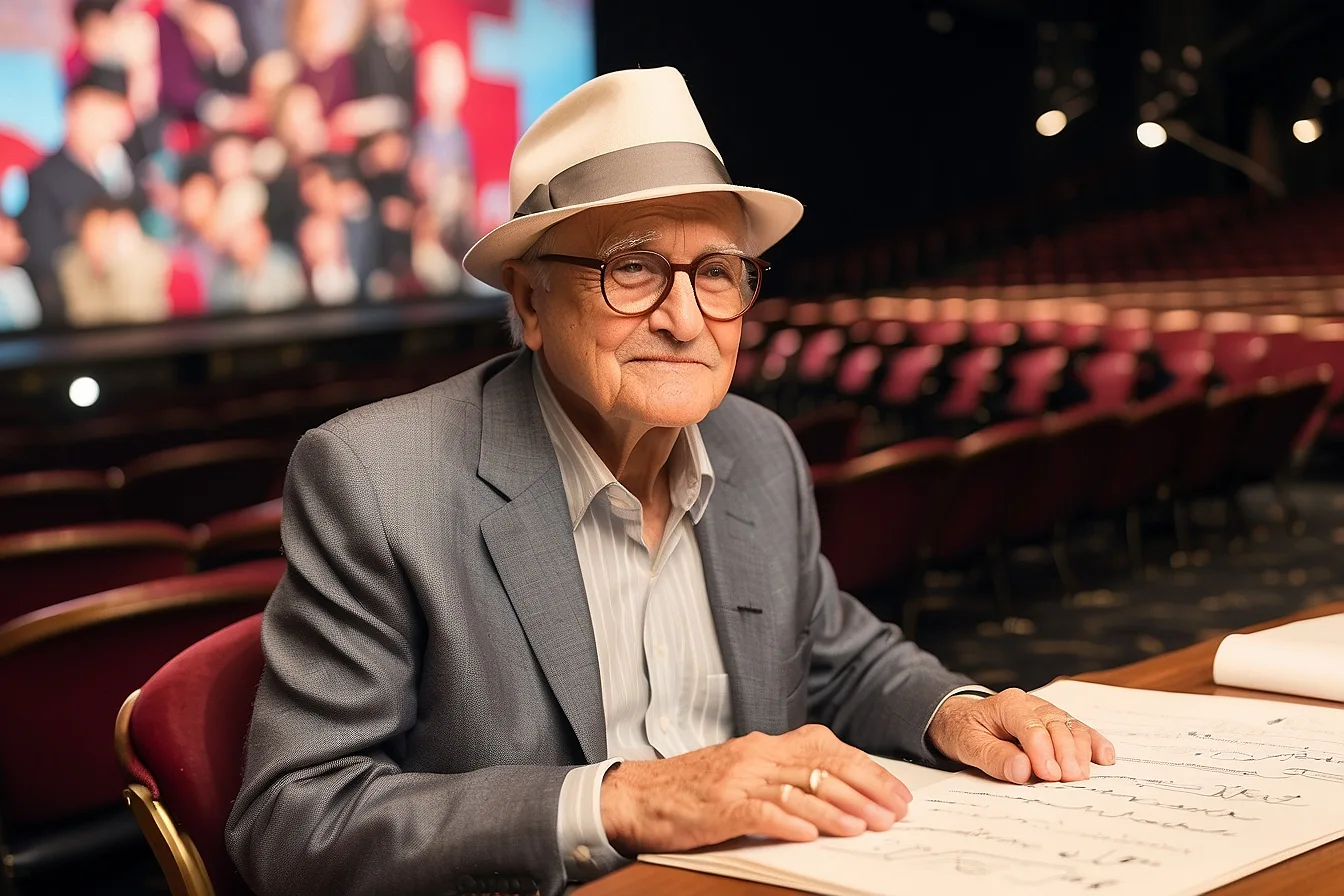The acclaimed author, producer, and developer Norman Lear, who revolutionized American comedy in the 1970s with bold and immensely popular sitcoms like “All in the Family” and “Sanford and Son,” passed away on Tuesday. His age was one hundred and one.
The representative for Norman Lear confirmed that he died of natural causes at his Los Angeles home. A private service for the immediate family will be arranged in the coming days.
Lear’s family appreciated every person in a statement for their love and support of their outstanding husband, father, and grandfather. They described Norman as someone who lived a life of creativity, resilience, and compassion. He had an intense affection for our country, established the ideas of social justice for all, and dedicated his entire life to maintaining the values of equality and justice. Knowing him and loving him has been the greatest gift, they added, as they privately mourned the loss of this remarkable individual.
When Lear received nomination for an Oscar in 1968 for his screenplay for “Divorce American Style,” he was already setting up himself as one of the strongest comedic writers. A popular British comedy about a working-class man and his unstable family became the foundation for the new sitcom “All in the Family,” which made him well-liked as well. All political arguments of viewers found the show to be very popular very quickly.
Serious political, cultural, and social issues of the day, including racism, abortion, homosexuality, and the Vietnam War, have been discussed in his shows. “All in the Family” had two episodes in 1977 that revolved around the attempted rape of Archie Bunker’s wife, Edith, tackling sensitive subjects head-on.
Lear’s fresh approach brought significant ratings success, with “All in the Family” and “Sanford and Son,” based on a Los Angeles Black family, ranking as the number one and number two shows in the country for a time. He received recognition for “All in the Family” with four Emmy Awards from 1971 to 1973 and a 1977 Peabody Award, acknowledging the show for providing comedy with social conscience.
Apart from television, Norman Lear also contributed to the big screen with credits such as “Come Blow Your Horn” (1963), “The Night They Raided Minsky’s” (1968), “The Man Who Came to Dinner” (1971), “Stand By Me” (1986), and “The Princess Bride” (1987). He even wrote and directed the sharp comedy “Cold Turkey” in 1971, addressing the tobacco industry.
In the 1980s, Lear co-founded Embassy Pictures with partner Jerry Perenchio, later selling the company to Columbia Pictures for 0 million.In 1999, he increased to popularity in the music industry when he joined up with Hal Gaba, a former executive at Concord Music Group, to take the control of the industry, which at the time included independent labels like Concord Jazz, Fantasy, Stax, Riverside, Milestone, Rounder, and Vanguard.
Norman Lear was not only a creative force in the entertainment industry but also a vocal advocate against the activities of the conservative moral majority. To take on the actions of the conservative moral majority, he created the advocacy group People for the American Way in 1981.
Unveiling the awards and honors of Norman lear
Lear, honored with a place in the Television Academy’s Hall of Fame, a Lifetime Achievement Award from the Producers Guild of America, and multiple awards from the Writers Guild of America, received the National Medal of Arts in 1999 and was honored at the Kennedy Center in 2017.
In the later years, he even refused to attend a reception at the White House in protest of President Donald Trump’s policies.
Forever noticed as an inventor who used comedy to entertain, anger, and bring people jointly around important social problems, Norman Lear will always be linked to comedy.
The Norman Lear was born on July 27, 1922, in New Haven, Conn. Both of his parents were of Russian-Jewish descent; he claimed in interviews that his father and mother were inspirations for the characters Archie and Edith Bunker. In 1942, he left Emerson College in Boston to enlist in the U.S. Air Force, where he served as a radio operator and gunner on B-17 bombers in the European Theater, completing 52 missions.
The Norman Lear moved to Los Angeles to open a shop after the war and followed a career as a press agent. But when he joined up with his brother-in-law, Ed Simmons, he started writing comedies. This collaboration led to his first significant opportunity to write for Dean Martin and Jerry Lewis, the country’s most famous comedy act at the time, during the presentation of “The Colgate Comedy Hour” in 1952-53. He became a sought-after writer for numerous television programs starring Martha Raye, Tennessee Ernie Ford, Celeste Holm, and George Goble after he worked up with Bob Yorkin.
In the 1960s, the Norman Lear began his writing career and produced special films featuring Bobby Darin, Danny Kaye, Andy Williams, and Henry Fonda. Although the liar had success in dramatic films in the latter half of the 60s, it was with the development of “All in the Family” that he reached the pinnacle of TV producers. This groundbreaking British series, inspired by “Till Death Us Do Part,” became the first American sitcom to be broadcast live in front of a studio audience, challenging social norms and addressing taboo subjects.
The vibrant new series quickly gained popularity, thanks to the superb chemistry of its four stars: the conservative, bigoted Archie as played by Carroll O’Connor, his feisty, outspoken wife Edith portrayed by Jean Stapleton, their tough daughter Gloria played by Sally Struthers, and Rob Reiner as Gloria’s hippie husband, Michael “Meathead” Stivic. The show was rebroadcast during its run in 22 Emmys; O’Connor won four Emmys for his role, Stapleton won three, Reiner won two, and Struthers won one. (The series and its spinoff “The Jeffersons” about an ABC special produced by the liar, won the 2019 Emmy.)
The show became a cultural phenomenon, leading to one series after another: “Maude,” featuring Bea Arthur as Edith’s conservative, sharp-tongued cousin (allegedly based on the liar’s second wife Frances), and Sherman Hemsley and Isabel Sanford starring in “The Jeffersons,” which doubled Struthers’ role (following the character’s divorce); “Gloria,” with Struthers, continuing her character’s life after divorce; Marla Gibbs with her lifelong maid Florence Johnston as the title character in “Checking In”; and, in the ’90s, “704 Hauser,” a short-lived series set in the Bunker’s former home. “Archie Bunker’s Place,” a spinoff series set in Archie’s bar in Queens, ran from 1979 to 1983.


After an appearance as a guest star on the UK TV show “Steptoe and Son,” another Tandem show based on the US sitcom, he played Point Man in a 1965 TV film that he adapted. “Sanford and Son” featured the cantankerous, irascible junkman Fred Sanford, played by experienced black comic Redd Foxx, against his long-suffering son Lamont (Demond Wilson). People were impressed by Foxx’s salty portrayal of humour in the Bunker style, and the show got successfully for six seasons.
After the dissolution of the Tandem partnership in 1975, the liar moved forward to develop another innovative project, “Mary Hartman, Mary Hartman.” Designed as a daily show with a continuous story like daytime network dramas, it starred Louise Lasser as the main title character, who worked
on the quirky small-town dramas of Fernwood. “Hartman” and its successor, “Forever Fernwood,” ran for more than 400 episodes and gave birth to the Fox talk show “Fernwood 2 Night,” where “Hartman” veterinarian Martin Mull hosted Barth Gimble and Fred Willard as his assistant Jerry Hubbard.
Although “All in the Family” and its successors changed television forever with its rapid political progress and yet unseen clarity, later the liar focused on what the show ultimately achieved.
He said, ”I have not seen television change at all. The Judeo-Christian morality that has been running for thousands of years has not helped eradicate racism in our country at all. So I think the idea of changing things with half an hour of comedy is foolish.”
The Norman Lear’s final two works, the sitcom “Sunday Dinner” and “704 Hauser,” were briefly seen in a condensed form in the early 90s. While he had no connection to its production, he credited his executive producer role in the reboot of “One Day at a Time,” which focused on the Alvarez family cantered around a Cuban-American single mother, for its attention to the set and Latinx family.
The Lear focused on showing what he had finally achieved in his presentations in his later years.
He said, “I haven’t seen television change at all. Our Judeo-Christian morality hasn’t helped eradicate racism in our country at all. So I think the idea of changing things with half an hour of comedy is foolish.”
The Lear’s last presentations included “Way Past Cool” (2000) and “El Superstar: The Unlikely Rise of Juan Frances” (2008). His documentary presentations include “Pete Seeger: The Power of Song” (2007).
His long career was covered in the 2016 documentary “Norman Lear: Just Another Version of You.” In his later years, he hosted the podcast “All of the Above with Norman Lear” and published a memoir, “Even This I Get to Experience” in 2014. He also worked as an executive producer on the documentary “Rita Moreno: Just a Girl Who Decided to Go for It.”
Besides his activities with People for the American Way, which monitored judicial appointments, First Amendment challenges, and activities by right-wing groups, Lear founded the non-profit, non-partisan organization Declare Yourself in 2004 to encourage young people to vote.
His third wife, Lyn Davis, survives with six children and four grandchildren.”


